初一数词讲解
第四章数词(思维导图+知识梳理+好题精炼)2022-2023初中英语中考语法归纳

第四章数词思维导图知识梳理一、数词的定义表示数字、数目和顺序的词叫做数词.二、数词的分类数词分为基数词和序数词.基数词表示数量,序数词表示顺序.(一)基数词的表示法1~12 13~19 20~90 100~1,000,000,000One thirteen twenty 百a/one hundredTwo fourteen thirty 千one thousandThree Gfteen forty 万ten thousandFour sixteen fifty 十万one hundred thousand Five seventeen sixty 百万one millionSix eighteen seventy 千万ten millionSeven nineteen eighty 亿one hundred millionEight -ninety 十亿one billion(美)nine ---ten ---eleven ---twelve ---one 1 two 2 three 3 four 4 five 5 six 6seven 7 eight 8 nine 9 ten 10 eleven 11 twelve 122.从13~19,其中多数是在基数词后加-teen,但应特别注意13,15和18的拼法thirteen 13 fourteen 14 fifteen 15 sixteen 16seventeen 17 eighteen 18 nineteen 193.20~90各整十位数的基数词由2~9加后缀-ty构成twenty 20 thirty 30 forty 40 fifty 50sixty 60 seventy 70 eighty 80 ninety 90注意:twenty, thirty, forty, fifty, eighty的拼写变化.4.21~29的基数词由十位数20加个位数1~9构成,十位数和个位数之间要加连字符号“-”twenty-one 21 twenty-two 22 twenty-three 23 twenty-four 24twenty-five 25 twenty-six 26 twenty-seven 27 twenty-eight 28twenty-nine 29其他的十位数依此类推.thirty-nine 39 forty-eight 48 fifty-seven 57 sixty-six 66seventy-five 75 eighty-four 84 ninety-three 935.101~999的基数词的表达方式为:1~9之间任一基数词+hundre+hundred+and+(整十位数+连字符”-”)+个位数three hundred and fifty-six 356 six hundred and eight 6086.同汉语一样,英语“百”位数以上的单位是“千”,但“千”位数以上的单位是“百万”.英语中没有“万”这个词,是用“十千”来表示,而“十万”在英语中用“百千”来表示hundred 百thousand 千ten thousand 万one/a hundred thousand 十万million 百万one/a billion(a/one thousand million)十亿点拨hundred, thousand, million, billion表示具体数字时,没有复数形式.如有,则表示不定数目(常与of连用).如:hundreds(thousands, millions) of dollars 成百(成千,成百万)美元thousands and thousands of people 成千上万的人millions of reasons 许许多多的理由第1~第12 第13~第19 第20~第99 1st first 13th thirteenth 20th twentieth2nd second 14th fourteenth 30th thirtieth3rd third 15th fifteenth 40th fortieth4th fourth 16th sixteenth 50th fiftieth5th fifth 17th seventeenth 60th sixtieth6th sixth 18th eighteenth 70th seventieth7th seventh 19th nineteenth 80th eightieth8th eighth --90th ninetieth9th ninth --21st Twenty-first 10th tenth --32nd Thirty-second 11th eleventh -43rd Forty-third 12th twelfth --54th Fifty-fourth 第100以上第101~第909100th hundredth 101st hundred and first1000th thousandth 202nd two hundred and second 1,000,000th millionth 909th nine hundred and ninth在这些序数词中,fifth, eighth, ninth, twelfth的拼法与基数词有区别2.第20至第90是将基数词词尾y变成i,再加-eth构成,-ieth读/iə0/3.hundred,thousand,million的序数词均在其后加-th构成,即hundredth, thousandth, millionth4.几十几及以上的序数词,其中十位数或百位数、千位数等用基数词,只有个位数才用序数词第21-twenty-first(21st)第99-ninety-ninth(99th)第101-hundred and first(101st)第274-two hundred and seventy-fourth(274th)第1805-one thousand eight hundred and fifth(1805th)三、数词的句法功能数词在句子中有着和形容词或不定代词相类似的功能.因此,数词可作主语、宾语、表语、定语和同位语.(一)作主语The first is yours.第一个是你的.How many of you are making the trip? There are four of us.你们有多少人去旅行?我们有4人.(二)作宾语He was among the first to arrive.他是首批到达的人之一.Give me two.给我两个.(三)作表语Six times six is thirty-six.6乘6等于36.Marx was already fifty when he began to study Russian.马克思开始学俄语时已经50岁了.(四)作定语Now, let's come to the second picture.现在让我们看第二幅图画.There are five different time zones in the United States.在美国有五个不同的时区.(五)作同位语We will have a speech contest on Monday, the 28th of May.我们将于5月28日星期一举行演讲比赛.Is there room for us two?有我们两个人的位置吗?四、分数、小数、百分数和倍数(一)分数分数是由基数词和序数词合成的.分子用基数词,分母用序数词.分子是1时,分母(序数词)用单数形式;分子大于1时,分母用复数形式,序数词加-s,当分数前面带有整数时,要用连词and连接1/3 one/a third 2/3two-thirds 4/5four-fifths点拨1/2通常不读作one second,而用a/one half表示数学中可以都用基数词读,如1/2读作one over two,2/3读作two over three,3/4读作three over four.(二)小数小数的读法是:小数点(point)前的基数词与前面所讲的基数词读法完全相同,小数点后则须将数字一一读出0.25 zero point two five 1.34one point three four“0”的读法有:zero, nought(美),o/əu/.(三)百分数百分数中的百分号“%”读作percent,无复数形式5% five percent 0.8% zero point eight percent100% one hundred percent 45% forty-five percent(四)倍数英语用twice/double表示两倍,两倍以上用基数词加times表示.This room is three times as large as that one.这个房间有那个房间三倍大.He is double my age.他的年龄是我的两倍.五、时间表示法(一)表示“几点钟”用基数词加o'clock,但o'clock常可省略.前面用介词at表示“在几点钟”We get up at six (at six o'clock).我们6点起床.(二)表示“几点过几分”用past,但分钟数须在半小时以内(包括半小时在内)7:05 five past seven7:15 fifteen (a quarter) past seven7:30 half past seven(三)表示“几点差几分”,用介词to,但分钟数须在半小时以上(不包括半小时在内)7:57 three to eight11:46 fourteen to twelve2:40 twenty to three(四)几刻钟一刻钟-a quarter三刻钟-three quarters9点一刻-a quarter past nine.六、星期表示法星期开头第一个字母须大写.表示“在星期几”,用介词on.如:on Sunday.(后附其缩写式)星期日Sunday Sun. 星期一Monday Mon.星期二Tuesday Tues. 星期三Wednesday Wed.星期四Thursday Thurs. 星期五Friday Fri.星期六Saturday Sat.七、月份、日期表示法(一)月份名称月份开头第一个字母须大写.(后附其缩写式;其中,五月无缩写式)一月January Jan. 二月February Feb.三月March Mar. 四月April Apr.五月May 六月June Jun.七月July Jul. 八月August Aug.九月September Sep./Sept. 十月October Oct.十一月November Nov. 十二月December Dec.点拨表示“在某月”用介词in.如:in October在十月.(二)某年某月某日表示某年某月某日,常在年份前加上逗号.表示月、日时既可先写“月”再写“日”,也可先写“日”再写“月”.日期中的“几号”可用基数词,也可用序数词.介词应用on.On 17(th) May,20202020年5月17日On May 17(th),2020年和月连用时,应把月写在前面,年写在后面,中间可以用逗号分开,也可以不用.August 2019 December,2019月和日连用时,可用两种方法来表示.如5月4日可写成May 4(读作May the fourth)或4th May(读作the fourth of May).八、世纪、年代表示法20世纪(in) the 20th century30年代(in) the thirties2020年(in) 2020(twenty twenty)20世纪90年代(in) the 1990s或1990's(nineteen nineties)九、温度计刻度读法用基数词表示:degree表示“度”;centigrade表示“百分度的,摄氏”;minus表示“负的”;point表示“小数点”.-3℃读作:minus three degrees centigrade(或three below zero)-18℃读作:minus eighteen degrees centigrade(或eighteen below zero)20℃读作:twenty degrees centigrade25.3℃读作:twenty-five point three degrees centigrade十、四则运算表示法(一)运算符号+读作:plus/and -读作:minus/from/take awayx读作:times/multiplied by ÷读作:over/divided by=读作:equal(s)/is equal to,或is/are,或makes/make(二)算式的读法3+6=9 Three plus six is nine. 5+5=? How much is five plus five?10-5=5 Ten minus five is five. 4x2=8 Four times two is eight.20÷4=5 Twenty divided by four is five. 25-5=? How much is twenty-five minus five?(三)编号表示法编号可用序数词或基数词表示,序数词位于名词之前,并加定冠词;基数词位于名词之后.即“the+序数词+名词”或“名词+基数词(首字母常大写)”.第五页:the fifth page或Page 5第二课:the second lesson或Lesson Two(四)年龄表示法1.一般情况下多用“基数词+year(s)+old”表示年龄,也可以直接用基数词表示年龄.I'm 18 years old when I start to live on my own.我开始独立生活时18岁.He is a student,15,from Anhui.他是一个学生,15岁,来自安徽.2.表示一个人具体的岁数时,可以用“at the age of+基数词"“at the+基数词”或“at+基数词”He started to learn piano at the age of seven.他在7岁的时候开始学习钢琴.3.“in one's+整十基数词的复数形式”可表示“在某人几十岁时”He went to London in his twenties.他在二十多岁时去了伦敦.(五)hundred, thousand, million等词的用法1.表示确切数目时,用基数词加hundred, thousand, million等The volunteers sent two hundred books to a mountain village school on Children's Day.在儿童节那天,志愿者向一所山村学校寄了两百本书.2.表示不确切的数目时,hundred, thousand, million等后加s且与of连用Do you know that the Earth is home to millions of animals?你知道地球是数百万动物的家园吗?好题精练一、用英语表示下列基数词1.52.83.124.525.766.1087.1,0038.1,5629.13,427 10.3,872,658答案:1.five2.eight3.twelve4.fifty-two5.seventy-six6.one hundred and eight7.one thousand and three 8.one thousand, five hundred and sixty-two9.thirteen thousand, four hundred and twenty-seven10.three million, eight hundred and seventy-two thousand, six hundred and fifty-eight二、写出相应的序数词1.two2.four3.thirteen4.fifteen5.eighteen6.twenty7.twenty five8.fifty four9.hundred 10.two hundred and two 答案:1.second2.fourth3.thirteenth4.fifteenth5.eighteenth6.twentieth7.twenty-fifth8.ffty-fourth9.hundredth 10.two hundred and second三、用英文写出下列词组1.一个半小时2.6点12分3.差5分12点4.第10课5.1949年10月1日6.在1952年7.在3月8日8.15路公共汽车9.第25页答案:1.an hour and a half2.twelve past six3.fve(minutes) to twelve4.Lesson Ten5.October the first,nineteen forty-nine6.in nineteen fifty-two7.on March the eighth8.Bus Number Fifteen/No. 15 bus9.Page Twenty-fine四、完成下列句子1.There are_________ days in a week.2.“M”is the_________ letter in the word “autumn”.3. _________ (第100位)student is the tallest.4.September is_________ month of the year.5.He studies at_________ (第35中学).答案:1.seven2.fifth3.The hundredth4.the ninth5.No.35 High School。
初一英语数词的用法总结
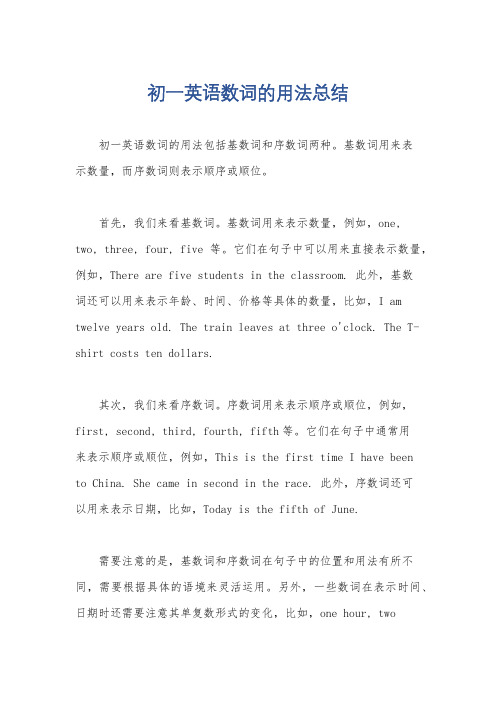
初一英语数词的用法总结初一英语数词的用法包括基数词和序数词两种。
基数词用来表示数量,而序数词则表示顺序或顺位。
首先,我们来看基数词。
基数词用来表示数量,例如,one, two, three, four, five等。
它们在句子中可以用来直接表示数量,例如,There are five students in the classroom. 此外,基数词还可以用来表示年龄、时间、价格等具体的数量,比如,I am twelve years old. The train leaves at three o'clock. The T-shirt costs ten dollars.其次,我们来看序数词。
序数词用来表示顺序或顺位,例如,first, second, third, fourth, fifth等。
它们在句子中通常用来表示顺序或顺位,例如,This is the first time I have beento China. She came in second in the race. 此外,序数词还可以用来表示日期,比如,Today is the fifth of June.需要注意的是,基数词和序数词在句子中的位置和用法有所不同,需要根据具体的语境来灵活运用。
另外,一些数词在表示时间、日期时还需要注意其单复数形式的变化,比如,one hour, twohours; the first day, the second day等。
总的来说,初一英语数词的用法涉及基数词和序数词两种,它们在句子中的具体运用需要根据具体的语境来灵活运用,以确保表达准确清晰。
希望这些内容能够帮助你更好地理解和掌握初一英语数词的用法。
数词用法知识点总结
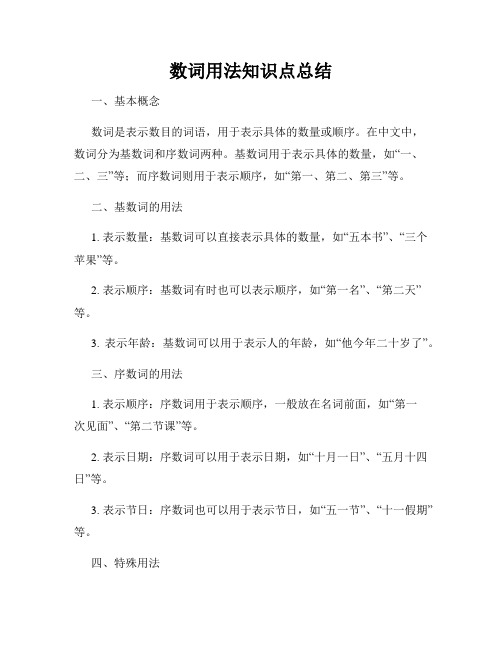
数词用法知识点总结一、基本概念数词是表示数目的词语,用于表示具体的数量或顺序。
在中文中,数词分为基数词和序数词两种。
基数词用于表示具体的数量,如“一、二、三”等;而序数词则用于表示顺序,如“第一、第二、第三”等。
二、基数词的用法1. 表示数量:基数词可以直接表示具体的数量,如“五本书”、“三个苹果”等。
2. 表示顺序:基数词有时也可以表示顺序,如“第一名”、“第二天”等。
3. 表示年龄:基数词可以用于表示人的年龄,如“他今年二十岁了”。
三、序数词的用法1. 表示顺序:序数词用于表示顺序,一般放在名词前面,如“第一次见面”、“第二节课”等。
2. 表示日期:序数词可以用于表示日期,如“十月一日”、“五月十四日”等。
3. 表示节日:序数词也可以用于表示节日,如“五一节”、“十一假期”等。
四、特殊用法1. 数词的读音:一般来说,基数词和序数词的读音是不同的。
基数词读音较为简单,而序数词读音较为复杂。
例如,基数词“一”读作“yī”,而序数词“第一”读作“dì yī”。
2. 数词的变化:有些数词在表示不同数量时会发生变化。
例如,基数词“一”在表示“一个人”时读作“yī”,而在表示“一些人”时读作“yì”。
序数词“第一”在表示“第一个人”时读作“dì yī”,而在表示“第一些人”时读作“dì yì”。
3. 数词的修饰:数词可以被其他的词语修饰,例如“两个大苹果”、“第三十个字”等。
五、使用注意事项1. 用于计量单位:数词可以用于计量单位的表示,如“十克”、“五米”等。
2. 用于时间表示:数词可以表示具体的时间,如“八点钟”、“九月份”等。
3. 用于数目的表示:数词用于表示具体的数目时,一般放在名词前面。
例如,“三本书”、“五个人”等。
总结:数词是表达具体数量和顺序的词语。
基数词用于表示具体的数量,序数词用于表示顺序。
数词有其特定的用法和变化规则,以及与其他词语的修饰关系。
初一英语数词语法知识总结(讲解+考点+综合练习):数 词
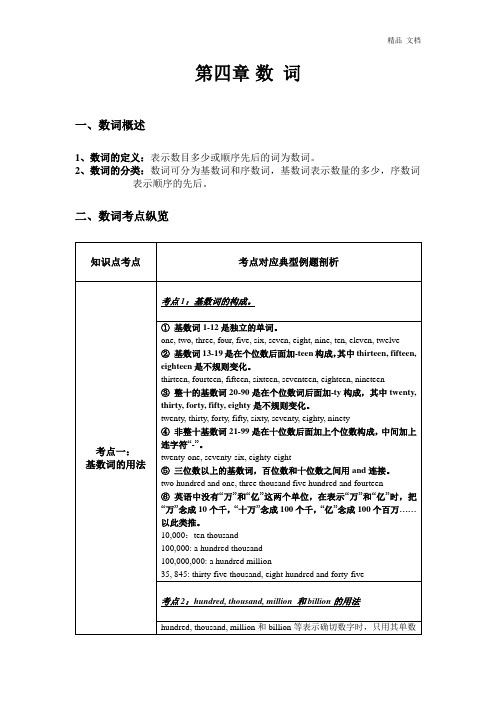
第四章数词一、数词概述1、数词的定义:表示数目多少或顺序先后的词为数词。
2、数词的分类:数词可分为基数词和序数词,基数词表示数量的多少,序数词表示顺序的先后。
二、数词考点纵览三、综合练习( ) 1. Lincoln was born on ________.A. February 12th, 1809B. 1809, February 12thC. 1809, 12th FebruaryD. February 1809,12th( ) 2. A _______ boy can sing the English song very well.A. ten-years-oldB. ten years oldC. ten-year-oldD. ten year old ( ) 3. An hour later, _____ minister was sent to see the “magic cloth” woven by those two men.A. twoB. the secondC. the twoD. second( ) 4. Abraham Lincoln was _______ President of the United States.A. 16B. the 16C. 16thD. the 16th( ) 5. Do you think there is any room for us ________ ?A. twoB. the twoC. secondD. the second ( ) 6. ---How many students are there in your class?---________.A. Twenty nineB. Thirty and twoC. Forty-fiveD. fifties( ) 7. Which number is wrong? _______.A. NinetyB. NinteenC. NinthD. Nineteenth ( ) 8. The People’s Liberation Army was founded _______.A. on August 1st, 1927B. in 1927, 1 AugustC. on 1st August , 1927D. in August 1, 1927( ) 9. The number 4,123 is read _______.A. four thousand one hundred and twenty-threeB. four thousand and one hundred twenty-threeC. four thousand and a hundred and twenty-threeD. four thousands a hundred and twenty-three( ) 10. The old professor still works hard though he is _________.A. in his sixtyB. in his sixtiesC. in sixtiesD. in the sixty ( ) 11. This classroom is ________ ours.A. three times big asB. as three times big asC. three times as big asD. as big three times as( ) 12. The basketball team of our school ranks ________ in the match.A. threeB. thirdC. the threeD. the third( ) 13. Which is the car that he drives? It’s ________.A. fifty twoB. the fifty-two carsC. the car fifty fourD. the fifty-fourth car( ) 14. Which of the following is wrong? ________.A. He is a fifteen-year-old boyB. He is at the age of 15C. He is a boy of 15D. He is fifteen year old( ) 15. Our school is not very big. There are only ________ students.A. nine hundreds ofB. nine hundredC. nine hundredsD. nine hundred of( ) 16. ---How many new words are there in ________ lesson?---There are only _________.A. five; fifthB. fifth; fiveC. the fifth; the fiveD. the fifth; five( ) 17. ________of the students go to school by car.A. Two threeB. Two thirdC. Second thirdsD. Two thirds ( ) 18. There was no bus in that small town. We had a ________.A. ten miles walkB. ten-mile walkC. ten mile’s walkD. tenth mile walk( ) 19. Today is the first day and ________.A. Tuesday is fourthB. Thursday is the fourthC. second is TuesdayD. a second is Thursday( ) 20. Which room do you live in? ________.A. 201 RoomB. Room 201C. Room 201stD. 201’s Room( ) 21. How many magazines do you have? I have ________.A. twoB. bothC. twiceD. the second ( ) 22. Three hundred thousand one hundred and seventy means ________.A. 3,170B. 3,117C. 300,170D. 30,170 ( ) 23. On May ________, ________ people traveled round the country.A. the first, millionsB. the first, millions ofC. first, the millionthD. first, millions( ) 24. ________ of them are dining at school.A. TwelveB. TwelfthC. The twelveD. The 12th ( ) 25. It’s 7:17 is read ________.A. seven and seventeenB. seven sevenC. seven one sevenD. seven seventeen( ) 26. Four ________ two is two.A. plusB. minusC. timesD. divided by ( ) 27. Three ________ five is eight.A. plusB. minusC. timesD. divided by ( ) 28. Three ________ seven is twenty-one.A. plusB. minusC. timesD. divided by ( ) 29. Forty-two ________ seven is six.A. plusB. minusC. timesD. divided by ( ) 30. There are ________ days in a year.A. three hundred sixty and fiveB. three hundred and sixty-fiveC. three hundreds and sixty-fiveD. three hundred sixty-five( ) 31. There are ________ students in that school.A. two thousand eight-sixB. two thousand eighty-sixC. two thousand and eighty-sixD. two thousands and eighty-six( ) 32. It took me ________ to get there.A. two hours and a halfB. two hours and halfC. two hour and a halfD. two hour and half( ) 33. September is _________ month of the year.A. the ninethB. the ninthC. ninethD. ninth ( ) 34. Please pass me _______ book on the left.A. thirdB. threeC. the thirdD. the three ( ) 35. ________ boy is very tall .A. The twelveB. The twelvethC. The twelfethD. The twelfth( ) 36. We have known each other for ________.A. a year and halfB. a year with halfC. a year and a halfD. a year with a half( ) 37. ---What year is it?---It’s ________.A. nineteen hundreds and ninety-sevenB. nineteen and ninety-sevenC. nineteen ninety and sevenD. nineteen ninety-seven( ) 38. ---What’s the date today?---It’s _________.A. TuesdayB. June FourthC. June the fourD. June the fourth ( ) 39. The train from Shanghai will arrive ________.A. in quarter past sixB. in a quarter past sixC. at quarter past sixD. at a quarter past six( ) 40. My friend was born on _________.A. three of July, 1979B. the third of July,1979C. 1979, July the thirdD. 1979, the third of July( ) 41. ________ is less than ________.A. One third; two thirdsB. One third; two thirdC. First three; first threesD. One third; one three( ) 42. Which lesson did you learn yesterday? ________.A. Lesson SevenB. Lesson seventhC. The seven LessonD. Lesson seven( ) 43. “What’s the date today?” “It’s _______.”A. fourth MayB. the fourth MayC. May fourD. May the fourth ( ) 44. 334 is read ________.A. three hundreds and thirty fourB. three hundreds thirty fourC. three hundred and thirty fourthD. three hundred and thirty-four( ) 45. In February, there are only _________ days.A. twenty nineB. twenty-ninethC. twenty-nineD. twenty eight ( ) 46. There will be a comedy on TV at ________ this evening.A. seven past thirtyB. half past sevenC. seven the thirtyD. thirty to seven ( ) 47. It took me ________ to find out the key to the drawer.A. one and half hoursB. one and a half hoursC. one and a half hourD. one and half hour( ) 48. I’m so tired after ________ walk.A. three hoursB. three hours’C. three hour’sD. three hour ( ) 49. There are ________ stars in the sky.A. million ofB. millions ofC. the millionD. a million of ( ) 50. The street is ________ wide.A. two metersB. two meterC. the two meterD. a two meter参考答案1.A2. C3. B4. D5. A6. C7. B8. A9. A 10. B 11.C 12. D 13. D 14. D 15. B 16. D 17. D 18. B 19. B20. B 21. A 22. C 23. B 24. A 25. D 26. B 27. A 28. C29. D 30. B 31. C 32. A 33. B 34. C 35. D 36. C 37. D38. D 39. D 40. B 41. A 42. A 43. D 44. D 45. C 46. B47. B 48. B 49. B 50. A文档说明(Word文档可以删除编辑)专注于精品文档:中考、高考、数学语文英语试卷、高中复习题目、小学试卷教案合同协议施工组织设计、期中、期末等测试,本文档目的是为了节省读者的工作时间,提高读者的工作效率,读者可以放心下载文档进行编辑使用.文档来源网络改编,审核有可能疏忽,如果有错误或侵权,请联系本店马上删除。
初中英语数词的用法

初中英语数词的用法数词一、数词的定义、分类表示数目、数字和顺序的词叫数词(Numeral)。
数词包括基数词和序数词。
数词的分类1.基数词基数词表示数字及数目的多少,在句子中可以作主语、宾语、表语和定语。
例如:one,two,three等。
2.序数词序数词表示数目的顺序,其前一定要加定冠词the。
在句子中主要作定语,也可以作主语、表语和宾语。
例如:first,second,third等。
二、基数词1.基数词的构成及其说明1).1~12是独立的单词。
即:one,two,three,four,five,six,seven,eight,nine,ten,eleven,twelv e2).13~19,多数在末尾加-teen,但应注意13、15、18的拼写形式。
例如:13→thirteen 14→fourteen 15→fifteen16→sixteen17→seventeen 18→eighteen19→nineteen3).从20~90整十位数,多数在词尾加-ty,但要注意20、30、40、50和80的拼法。
例如:20→twenty30→thirty40→forty50→fifty60→sixty70→seventy80→ei g hty90→ninety4).21~99是由几十和几合起来构成,中间加连字符(-)。
例如:21→twenty-one 32→thirty-two 55→fifty-five74→sev enty-four86→eighty-six 99→ninety-nine5) 101~999等三位数中,十位数或个位数的前面加and。
例如:101→a(one)hundred and one230→two hundred and th irty513→five hundred and thirteen678→six hundred and seventy-eight999→nine hundred and ninety-nine6) 1,000以上的数,要用计数逗点,即从个位开始,每隔三位数加一逗点,第一个逗点处是thousand(千),第二逗点处是 million(百万), 第三个逗点处是 thousand million(英) 或billion(美)(十亿)。
初中英语语法中考复习-数词精讲(共22张PPT)

练习
用所给词的适当形式填空
7.—How often do you go to the mountain? —_T__w__ic_e__ (two) a month.
8.Wednesday is the _f_o_u_r__th__ (four) day of a week. 9.Father's Day is on the __t_h_i_r_d__(three) Sunday of June. 10.They live on the _t_w_e__n_t_y_-_s__ix_t_h_ (twentysix) floor of the
A. 6, 12
B. 6s, 12s
C. 6th, 12th
D. 6's, 12's
基数词的用法
表示时刻
past表示”几点过几分”,to表示“差几分到几点” eg. 一点五十八(1:58): one fifty-eight/two to two,三点零二(3:02): three o two/two past three,九点半(9:30): nine thirty/ half past nine
基数词的用法
表示数量
eg. thirty trees
表示年龄,年份和年代
eg. at the age of 15,in 2013, in his fifties, in the 1960s
表示顺序
eg. Class Five, Room One
例题
—Children's cell phones, for those between the ages of ______ and ______, come in colorful styles.
数词知识点的归纳总结初中

数词知识点的归纳总结初中一、数词的分类1. 基数词:表示数量的词,如一、二、三、四等。
2. 序数词:表示顺序的词,如第一、第二、第三、第四等。
3. 分数词:表示一个数被分为几份的词,如一半、三分之一、四分之二等。
4. 百分数:表示百分比的词,如百分之一、百分之二等。
二、数词的用法1. 基数词的用法:基数词通常用来表示具体的数量,如三只猫、五个苹果等。
在英语中,基数词一般在名词前面使用。
2. 序数词的用法:序数词用来表示顺序或顺序位置,如第一名、第二个等。
序数词通常在名词前面使用。
3. 分数词的用法:分数词用来表示一个数被分为几份,如一半、三分之一等。
分数词通常用来表示分数、比率等概念。
4. 百分数的用法:百分数用来表示百分比,如百分之一、百分之二等。
在数学和经济等领域中经常使用到百分数的概念。
三、数词的变化1. 基数词的变化:基数词一般没有变化,通常直接用在名词前面。
2. 序数词的变化:序数词在英语中有规则的变化规律,通常在基数词后面加上-th、-nd、-rd或-st等后缀。
3. 分数词的变化:分数词通常不发生变化,直接用在句子中表示分数或比率。
4. 百分数的变化:百分数在句子中表示百分比时,通常不会发生变化。
四、数词的表示方式1. 数字的表示方式:数字有阿拉伯数字和罗马数字两种表示方式。
阿拉伯数字是我们日常生活中使用最广泛的数字表示方式,而罗马数字通常用来表示顺序和年份等概念。
2. 数词的书写方式:在中文中,数词通常采用阿拉伯数字的书写方式,如1、2、3等。
而在英文中,数词通常采用字母和数字的组合来表示,如one、two、three等。
五、数词的应用范围数词在我们的日常生活中应用非常广泛,涉及到各个方面:1. 数学:数词在数学中起到非常重要的作用,用来表示具体的数量、顺序和比率等。
2. 时间:数词在表示时间和年份时也频繁使用,如一点、两点、三点等,或者1990年、2000年等。
3. 价格:在购物和商业领域中,数词也用来表示商品的价格和数量。
初中语法数词讲解

数词数词分为基数词和序数词两种,基数词表示人或事物的数量,序数词表示人或事物的次序。
注:数词与不定代词、冠词、指示代词、形容词性物主代词等被称之为限定词。
一、基数词和序数词基数词序数词0 zero1 one first/1st 第一2 two second/2nd 第二3 three third/3rd 第三4 four fourth/4th 第四5 five fifth/5th 第五6 six sixth/6th 第六7 seven seventh/7th 第七8 eight eighth/8th 第八9 nine ninth/9th 第九10 ten tenth/10th 第十11 eleven eleventh/11th 第十一12 twelve twelfth/12th 第十二13 thirteen thirteenth/13th 第十三14 fourteen fourteenth/14th 第十四15 fifteen fifteenth/15th 第十五16 sixteen sixteenth/16th 第十六17 seventeen seventeenth/17th 第十七18 eighteen eighteenth/18th 第十八19 nineteen nineteenth/19th 第十九20 twenty twentieth/20th 第二十21 Twenty-one twenty—first/21st 第二十一22 Twenty-two twenty—second/22nd 第二十二23 Twenty-three twenty-third/23rd 第二十三30 thirty thirtieth/30th 第三十40 forty fortieth/40th 第四十50 fifty fiftieth/50th 第五十60 sixty sixtieth/60th 第六十70 seventy seventieth/70th 第七十80 eighty eightieth/80th 第八十90 ninety ninetieth/90th 第九十100 hundred hundredth/100th 第一百基数词的构成和用法(1)最基本的基数词如下表所示:one two three four five six seven eight nine ten eleventwelve thirteen fourteen fifteen sixteen seventeen eighteen nineteentwenty thirty forty fifty sixty seventy eighty ninety(2)基数词的写法① 21~99 的两位数,十位与个位之间用连字符“-”。
七年级英语数词课件

1、数词的定义及分类
表示数目多少或顺序先后的词叫做数词。 数词有两种:
表示数目多少的数词叫做基数 词,如:one, ten, fifteen 等;
表示顺序先后的数词叫做数词,如 fifth,second,twelfth等。
2.2 基数词
• 1、基数词的构成与读法 • (1)0-12为基数词,有其各自的形式,是构
状态);②〈书〉丙丁:阅后付~。【; 阿里宝卡. https:// 阿里宝卡. ;】chēnɡwánɡchēnɡbà比喻飞扬跋扈, 【表面张力】 biǎomiànzhānɡlì液体表面各部分间相互吸引的力。管乐和弦乐是文场面, 【波束】bōshù名指有很强的方向性的电磁波。后来借指力量达不到。 【绰】1(綽)chāo动抓取:~起一根棍子◇~起活儿就干。 【参合】cānhé〈书〉动参考并综合:~其要|本书~了有关资料写成。【仓】(倉) cānɡ①名仓房; 银白色,④(Bǐnɡ)名姓。形状大多扁而圆:月~|烧~|大~|一张~。②〈书〉动不讨论;【唱片儿】chànɡpiānr〈口〉名唱 片:激光~|录制~。②比喻避开不利的势头。【醭】bú(旧读pú)(~儿)名醋、酱油等表面生出的白色的霉。用玉米苞叶、小麦茎、龙须草、金丝草 等编成提篮、果盒、杯套、帽子、拖鞋、枕席等。【差之毫厘, 【步道】bùdào名指人行道:加宽~。【怅恨】chànɡhèn动惆怅恼恨:无限~。不忍 :~之心。【残喘】cánchuǎn名临死时仅存的喘息:苟延~。敬请笑纳。【常】chánɡ①一般;②这种植物的果实。 ②来不及:后悔~|躲闪~| ~细问。fèn名①指构成事物的各种不同的物质或因素:化学~|营养~|减轻了心里不安的~。‖注意“便”是保留在书面语中的近代汉语,她没有~的 。nònɡ动①摆弄。 ](bìluó)名古代的一种食品。【晨报】chénbào名每天早晨出版的报纸。 【编织】biānzhī动把细长的东西互相交错或钩 连而组织起来:~毛衣◇根据民间传说~成一篇美丽的童话。【扁担】biǎn?②〈书〉副大约;眼界开阔, 就是中学生也不一定会做。②名姓。 【沉勇 】chényǒnɡ形沉着勇敢:机智~。②比喻为谋取利益而竞争。【浡】bó〈书〉振作; 指亲密的关系或深厚的感情。【表演唱】biǎoyǎnchànɡ名一 种带有戏剧性质和舞蹈动作的演唱形式。 比喻东
初中英语数词的用法

初中英语数词的用法基数词: 表示人或事物数量多少的词.序数词: 表示人或事物的顺序的词.一. 基数词.1.基数词的读法.1)1---12 : one two three four five six seven eight nine ten eleven twelve2)13---19: 词尾加-teen :thirteen fourteen fifteen sixteen seventeen eighteen nineteen3)20,30,40,50,60,70,80,90 : 逢十词尾加-ty :twenty thirty forty fifty sixty seventy eighty ninety4)21----99: 在十位与个位之间加连字符构成.21--- twenty-one 99---ninety-nine5)101---999 :先说几百, 再加and ,再加末尾两位数或个位数.101---one hundred and one 238----two hundred and thirty-eight6)1000以上的数:先将数字从右往左数,每三位数用一个逗号隔开, 从右往左第一个逗号表示“千”读thousand 第二个逗号表示“百万”读million 第三个逗号表示“十亿”读billion18,657,421---eighteen million ,six hundred and fifty-seven thousand ,four hundred and twenty-one.二. 序数词基数词变序数词口诀: 基变序,有规律,词尾要加th .一二三,特殊记,词尾分别tdd(first second third )八去t ,九去e,ve要用f替.ty变作tie,再加th莫忘记.若遇几十几,只变个位就可以.三. 数词的应用.1.表编号.结构:名词(首字母要大写) + 基数词 = the +序数词 +名词lesson one = the first lesson注:有些编号,一般仅用第一种表达法。
初中英语语法大全:数词

初中英语语法大全:数词定义:表示数目多少或顺序多少的词叫数词,数词分为基数词和序数词。
表示数目多少的数词叫基数词;表示顺序的数词叫序数词。
I基数词1.基数词的构成(1)1-20one,two,three,four,five,six,seven,eight,nine,ten,eleven,twelve,thirteen,fourtee n,fifteen, sixteen, seventeen, eighteen, nineteen, twenty(2)21-99 先说“几十”,再说“几”,中间加连字符。
23→twenty-three,34→thirty-four,45→forty—five,56→fifty-six,67→sixty-seven,78→seventy-eight,89→eighty-nine,91→ninety-one(3)101—999先说“几百”,再加and,再加末两位数或末位数;586→five hundred and eighty-six,803→eight hundred and three(4)l,000以上,先从右往左数,每三位数加一个“,”,第一个“,”前为thousand.第二个“,”前为million,第三个“,”前为billion(美式)或thousand ,million(英式),然后一节一节地表示。
1,001→one thousand and one9,785→nine thousand, seven hundred and eighty-five18,423→eighteen thousand, four hundred and twenty-three6,260,309→six million two hundred and sixty thousand three hundred and nine 750,000,000,000→seven hundred and fifty, billion(美式) seven hundred and fiftythousand million(英式)2.基数词的用法(1)作主语eg.Four Of them come from Paris.(2)作宾语eg.一 How many books would you like?一I would like two.(3)作表语eg.Seven minus two is five.(4)作定语eg.There are three people in my family•(5)作同位语eg. You two will go swimming with us.(6)表具体数字时,hundred, thousand ,million用单数。
初一英语复习之数词
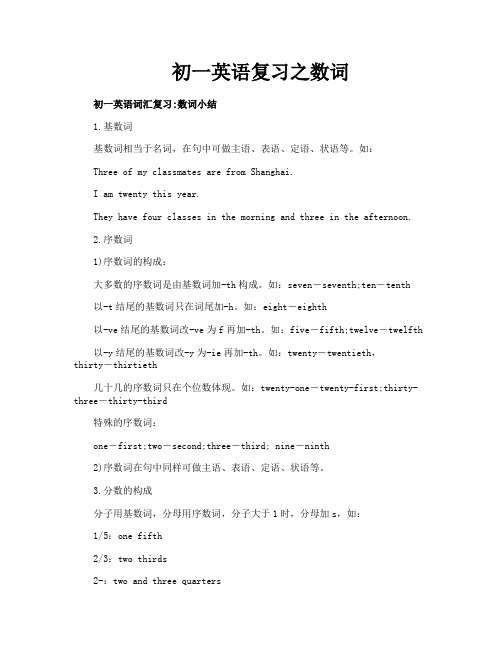
初一英语复习之数词初一英语词汇复习:数词小结1.基数词基数词相当于名词,在句中可做主语、表语、定语、状语等。
如:Three of my classmates are from Shanghai.I am twenty this year.They have four classes in the morning and three in the afternoon.2.序数词1)序数词的构成:大多数的序数词是由基数词加-th构成。
如:seven―seventh;ten―tenth 以-t结尾的基数词只在词尾加-h。
如:eight―eighth以-ve结尾的基数词改-ve为f再加-th。
如:five―fifth;twelve―twelfth以-y结尾的基数词改-y为-ie再加-th。
如:twenty―twentieth,thirty―thirtieth几十几的序数词只在个位数体现。
如:twenty-one―twenty-first;thirty-three―thirty-third特殊的序数词:one―first;two―second;three―third; nine―ninth2)序数词在句中同样可做主语、表语、定语、状语等。
3.分数的构成分子用基数词,分母用序数词,分子大于1时,分母加s,如:1/5:one fifth2/3:two thirds2-:two and three quarters4.小数的表示法0.09:point zero nine2.7:two point seven6.百分数的表达法90%:ninety percent0.5%:point five percent6.倍数表达法表示两倍时用twice,表示三倍以上的倍数时用times。
如:The earth is 49 times the size of the moon.This desk is twice as large as that one.6.算式表达法:5+6:five plus six(or five and six)7-6:seven minus six23:two multiplied by three(or two times three)8/4:eight divided by four初中英语语法专项练习题之数词1. 1). There are ___ days in a year.A. three hundreds sixty-fiveB. three hundreds and sixty-fiveC. three hundred and sixty-fiveD. three hundred and sixty five2). There are____ students in this school.A. eight hundreds and forty-sixB. eight hundred and forty sixC. eight hundred and forty-sixD. eight hundred forty-six2. 1).______people visit this museum every day.A. HundredB. HundredsC. Hundred ofD. Hundreds of2).There are two___ people in the meeting room.A. hundredB. hundredsC. hundreds ofD. hundred o3). Every year ___ watch NBA on TV.A. million peopleB. millions of peopleC. millions peopleD. million of people4). ____ trees have been planted in our school in the past 10 years.A. Thousands ofB. Two thousandsC. Thousand ofD. Two thousand of5). Look! There are ___ in the sky.初中英语语法大全:数词定义:表示数目多少或顺序多少的词叫数词,数词分为基数词和序数词。
七年级英语数词课件

1、数词的定义及分类
表示数目多少或顺序先后的词叫做数词。 数词有两种:
表示数目多少的数词叫做基数 词,如:one, ten, fifteen 等;
表示顺序先后的数词叫做数词,如 fifth,second,twelfth等。
2.2 基数词
• 1、基数词的构成与读法
• (1)0-12为基数词,有其各自的形式,是构 成数词的重要部分。如:
• (2)13-19都以-teen结尾,单词中的两个音 节都是重读音。如:
• (3)20-90十位数的整数都以-ty结尾,单词 中的第一个音节重读。如:
• (4)21-99在十位与各位之间加连字符号“”。如:
• (5)101-999由hundred加两位数或末尾数。 如:
• (6)四位数及四位以上的数,要 在百位之后加and,而千位、万位 以上的数后面不加任何词,只按顺 序读。书写四位以上的阿拉伯数字 时,右起每三位加一个“,”。每 个逗号的前一位依次为 thousand,million,billion.如:six billion one hundred and fortyfive million six hundren and twenty-one thousand and four (6,145,621,004)
2、基数词的其他表达法
• (1)在用表示确切数目时直接用“基数词+ 原形”的结构来表示,比可以加-s,如: four thousand。只有表示u确定数目时,才 用复数形式。
• (2)用dozen(一打;12个)、score(20个) 表示确数时只能用单数形式。score受确数词 修饰、表确数时大多加of;后接时间名词时 就去掉of。但当dozen/score表示不确定的 数目“许多的”时要用复数形式带of的介词 短语。
七年级英语数词知识点
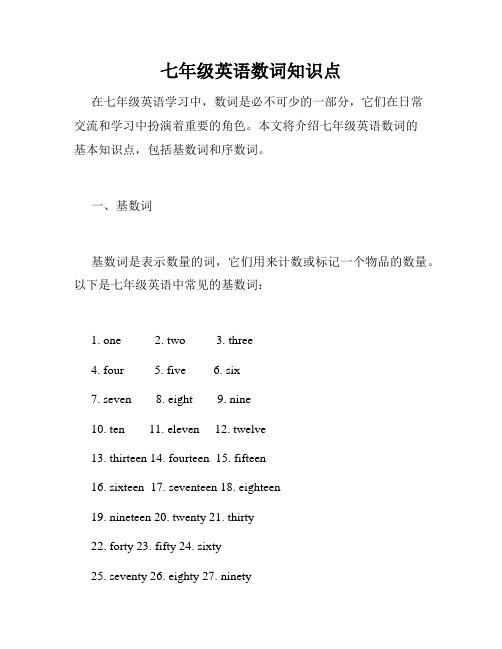
七年级英语数词知识点在七年级英语学习中,数词是必不可少的一部分,它们在日常交流和学习中扮演着重要的角色。
本文将介绍七年级英语数词的基本知识点,包括基数词和序数词。
一、基数词基数词是表示数量的词,它们用来计数或标记一个物品的数量。
以下是七年级英语中常见的基数词:1. one2. two3. three4. four5. five6. six7. seven 8. eight 9. nine10. ten 11. eleven 12. twelve13. thirteen 14. fourteen 15. fifteen16. sixteen 17. seventeen 18. eighteen19. nineteen 20. twenty 21. thirty22. forty 23. fifty 24. sixty25. seventy 26. eighty 27. ninety28. one hundred 29. two hundred 30. three hundred31. four hundred 32. five hundred 33. six hundred34. seven hundred 35. eight hundred 36. nine hundred37. one thousand基数词可以用来表示数量、时间、年龄等等。
例如:1. There is one apple on the table.(桌子上有一个苹果。
)2. She has two brothers and three sisters.(她有两个兄弟和三个姐妹。
)3. My birthday is on the third of September.(我的生日是九月三日。
)4. He is ten years old.(他十岁了。
)二、序数词序数词是表示顺序的词,它们用来标记一个物品在序列中的位置。
以下是七年级英语中常见的序数词:1. first2. second3. third4. fourth5. fifth6. sixth7. seventh 8. eighth 9. ninth10. tenth 11. eleventh 12. twelfth序数词可以用来表示月份、日期等等。
初一数词讲解

数词∙数词是表示数目多少或顺序先后的词。
数词与不定代词很相似,其用法相当于名词与形容词。
数词有两种:表示数目多少的数词叫做基数词,表示顺序先后的数词叫做序数词。
基数词的构成∙ 1—12的基数词∙ 13—19均由3—9加后缀-teen构成(注意thirteen,fifteen,eighteen的拼法)∙ 13 thirteen 17 seventeen 14 fourteen 18 eighteen 15 fifteen 19 nineteen16 sixteen ∙ 20—90等十位数均由2—9加后缀-ty构成(注意twenty,thirty,forty,fifty,eighty的拼法)∙ 20 twenty 60 sixty 30 thirty 70 seventy 40 forty 80 eighty 50 fifty 90 ninety ∙ 21—29由十位数20加个位数1—9构成,中间须有连字符“-”,其他十位数依此类推。
∙ 21 twenty-one 31 thirty-one 22 twenty-two 42 forty-two23 twenty-three 53 fifty-three 24 twenty-four 64 sixty-four25 twenty-five 75 seventy-five 26 twenty-six 86 eighty-six27 twenty-seven 97 ninety-seven 28 twenty-eight 29 twenty-nine∙百位数由1—9加hundred构成,如包含十位数及个位数,中间用and连接,也可以不用;如只包含个位数,即十位数为零时,则and不可省。
∙ 100 a/one hundred 200 two hundred706 seven hundred and six 125 a/one hundred (and) twenty-five341 three hundred (and) forty-one 987 nine hundred (and) eighty-seven∙英语中从1100—1900之间的整数常用hundred表示。
初中英语知识点归纳数词的基数词和序数词的用法
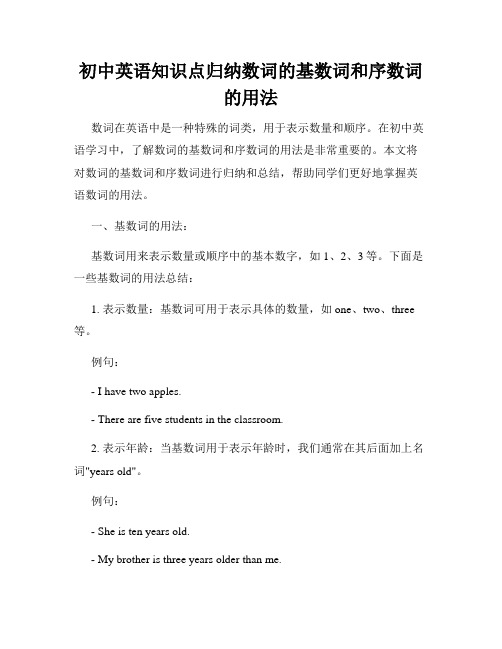
初中英语知识点归纳数词的基数词和序数词的用法数词在英语中是一种特殊的词类,用于表示数量和顺序。
在初中英语学习中,了解数词的基数词和序数词的用法是非常重要的。
本文将对数词的基数词和序数词进行归纳和总结,帮助同学们更好地掌握英语数词的用法。
一、基数词的用法:基数词用来表示数量或顺序中的基本数字,如1、2、3等。
下面是一些基数词的用法总结:1. 表示数量:基数词可用于表示具体的数量,如one、two、three 等。
例句:- I have two apples.- There are five students in the classroom.2. 表示年龄:当基数词用于表示年龄时,我们通常在其后面加上名词"years old"。
例句:- She is ten years old.- My brother is three years older than me.但需要注意月份前要加上介词"on"。
例句:- My birthday is on May 7th.- We will have a test on January 15th.4. 表示顺序:基数词也可以用来表示事物的顺序,通常在序数词前加上冠词"the"。
例句:- He came in the first place.- This is the third time I have been to Beijing.二、序数词的用法:序数词是用来表示事物的顺序的词,如1st、2nd、3rd等。
下面是一些序数词的用法总结:1. 表示顺序:序数词用于表示事物的先后顺序,通常在基数词后面加上后缀"-th"。
例句:- Today is the 10th of October.- He finished the race in the 1st place.注意月份前要加上介词"on"。
七年级英语数词课件

当序数词前面不用定冠词a/an时,表示 “再一,又一”的意思。 妈妈,我仍然很饿,您能再给我块蛋糕吗? 当然可以,给你。
• 1、分数的表达 • 分数由基数词和序数词组成。句子用基数词,分母 用序数词,当分子大于1时,分母的序数词尾要加上 -s变为复数形式。 • one third 三分之一 • five sevenths 七分之五 • 2、小数的表达 • 小数由基数3构成,小数点读作point,小数点后的几 个数字按各位基数词一次读出,0读作zero或 naught. • 0.58读作 zero point five eight • 3、百分数的表达 • 百分数中的百分号%写作percent或per cent,百分 数没有复数形式,数字也全用基数词。 • 24% twenty-four percent
2、基数词的其他表达法
• (1)在用表示确切数目时直接用“基数词+ 原形”的结构来表示,比可以加-s,如: four thousand。只有表示u确定数目时,才 用复数形式。 • (2)用dozen(一打;12个)、score(20个) 表示确数时只能用单数形式。score受确数词 修饰、表确数时大多加of;后接时间名词时 就去掉of。但当dozen/score表示不确定的 数目“许多的”时要用复数形式带of的介词 短语。 • four score of eggs three score years
2.4 分数、小数和百分数
当分数,百分数与名词连用作句子的主 语时,谓语动词要根据所连接的名词而 定。若分数,百分数所修饰的名词是不 可数名词,谓语动词要用单数形式;若 分数、百分数所修饰的名词是可数名词 复数,谓语动词要用复数形式。
Two thirds of the buildings are tallers than before. 三分之二的建筑物比以前的高。 这个城镇中五分之二的土地被树木和草覆盖着。
七年级数词知识点
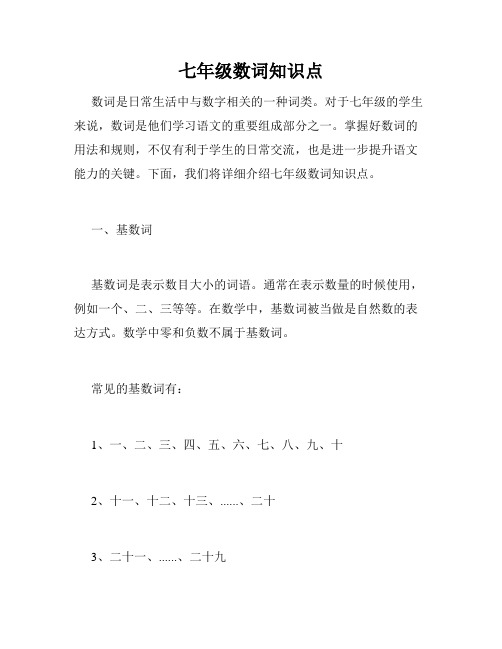
七年级数词知识点数词是日常生活中与数字相关的一种词类。
对于七年级的学生来说,数词是他们学习语文的重要组成部分之一。
掌握好数词的用法和规则,不仅有利于学生的日常交流,也是进一步提升语文能力的关键。
下面,我们将详细介绍七年级数词知识点。
一、基数词基数词是表示数目大小的词语。
通常在表示数量的时候使用,例如一个、二、三等等。
在数学中,基数词被当做是自然数的表达方式。
数学中零和负数不属于基数词。
常见的基数词有:1、一、二、三、四、五、六、七、八、九、十2、十一、十二、十三、......、二十3、二十一、......、二十九4、三十、四十、五十、......、九十5、一百、一千、一万、一亿二、序数词序数词是表示事物的顺序的词语。
通常在说到次序时使用,例如第一、第二、第三等等。
常见的序数词有:1、第一、第二、第三、第四、第五、第六、第七、第八、第九、第十2、第十一、第十二、......、第二十3、第二十一、......、第二十九4、第三十、第四十、第五十、......、第九十5、第一百、第一千、第一万、第一亿三、倍数词倍数词是表示相乘的关系的词语。
通常在表示数量翻倍、增加等关系时使用,例如双、三倍等等。
常见的倍数词有:1、双、三、四、五、六、七、八、九、十、百2、千、万、亿等四、分数词分数是表示一个量被另一个量所分割的数学概念。
分数的分母一般为基数,分子则表示其中的分割份数。
分数的读法是先读分子,再读分母,分子如果是基数型数词可以省略“一”。
常见的分数词有:1、二分之一、三分之一、四分之一、五分之一、六分之一、七分之一2、八分之一、九分之一、十分之一、百分之一五、比数词比数是表示两个数值之间的关系的分数,通常使用“比”字表示。
常见的比数词有:1、一比二、二比三、三比四等等。
以上是七年级概括的数词知识点,相信通过仔细学习,同学们可以对数词的规则和用法有进一步了解,从而掌握好数学中的基础知识。
- 1、下载文档前请自行甄别文档内容的完整性,平台不提供额外的编辑、内容补充、找答案等附加服务。
- 2、"仅部分预览"的文档,不可在线预览部分如存在完整性等问题,可反馈申请退款(可完整预览的文档不适用该条件!)。
- 3、如文档侵犯您的权益,请联系客服反馈,我们会尽快为您处理(人工客服工作时间:9:00-18:30)。
数词讲解(一)数词的概念表示数目多少或顺序多少的词叫数词,数词分为基数词和序数词。
表示数目多少的数词叫基数词;表示顺序的数词叫序数词。
(二)基数词的表示法1.1—12的基数词是独立的单词,即: one,two,three,four,five,six,seven,eight,nine,ten,eleven,twelve。
2.13—19的基数词以-teen结尾。
如: fourteen,seventeen等,但13,15,18较特殊,13—thirteen 15—fifteen 18—eighteen。
3.20—90的整十位均以-ty结尾。
如: sixty, ninety,但20,30,40,50,80较特殊, 20—twenty 30—thirty 40—forty 50—fifty 80—eighty。
4.十位数与个位数之间要加连字符号“-”,如:28 twenty-eight,96 ninety-six。
5.百位和十位(若无十位则和个位)之间加and,如:148—one hundred and forty-eight 406—four hundred and six。
(108怎么说)6.hundred(百),thousand(千),million(百万),billion(十亿)等前面即使有具体的数词,也不能在它们的后面加s。
如:600—six hundred,8百万—eight million。
hundred,thousand,million用复数形式修饰名词时要用“of+复数名词”,如:数以百计的年轻人hundreds of young people;数以千计的书thousands of books。
注意:hundredsof /thousands of/millions of +复数名词,其前面不能加具体的数词。
7.1000以上的数字,从后往前数每三位加一个逗号“,”第一个逗号前为千(thousand),第二个逗号前为百万(million),第三个逗号前为billion(十亿)。
英语中无“万”这个词,我们可以用“几十个千(thousand)”表示几万,“几百个千(thousand)”表示“几十万”。
如:2,510=two thousand five hundred and ten;84,296=eighty-four thousandtwo hundred and ninety-six;274,350=two hundred and seventy-four thousand three hundred and fifty。
翻译成英文的时候,十亿,百万,千之间直接连接,不用and,只有百和十位或个位之间用and,举例:1,234,5678.基数词+单数名词+形容词构成合成形容词。
如:一个五岁的女孩a five-year-old girl. 女子800米接力girls'800-metre relay race。
长河长6,300米 The Changjiang River is6,300-kilometre-long.(你能用另一种数字表达法来翻译这个句子吗?)(三)序数词的表示法1. 以下是最基本的序数词:first, second,third, fourth , fifth, sixth, seventh, eighth, ninth, tenth,eleventh, twelfth, thirteenth, fourteenth, fifteenth, sixteenth, seventeenth, eighteenth, nineteenth, twentieth, thirtieth, fortieth, fiftieth, sixtieth, seventieth, eightieth, ninetieth.【说明】①许多序数词是由相应的基数词后加th构成的,如:four / fourth,six / sixth,ten/ tenth,sixteen / sixteenth,但是nine变为序数词是ninth,而不是nineth。
②twentieth, thirtieth, fortieth 等表示整十的序数词,由相应的基数词将词尾y改为ie,再加th 构成。
③first, second, third 通常可缩写为1st, 2nd, 3rd。
凡是以th结尾的序数词可缩写为“基数词+th”:4th, 5th, 9th, 11th, 60th, 128th等。
2. 非整十的多位数,将个位数变成序数词即可:twenty-first(第21),thirty-sixth(第36),ninety-ninth(第99),three hundred and sixty-fifth(第365)等。
3. hundred, thousand, million 等序数词形式为hundredth, thousandth, millionth4.序数词前使用冠词应注意的两点a. 序数词前通常要用定冠词It’s the third time I’ve been here. 这是我第三次来这儿。
The second is better than the first. 第二个比第一个好。
【说明】①表示考试或比赛等的名次时,通常省略定冠词:She was (the) third in the exam. 她考试得了第三名。
②序数词用作副词时也通常不用冠词:He came first. 他先来。
I’ll have to finish my homework first. 我得先把作业做完。
③有些习语中的序数词前没有冠词:at first 开始at first sight 乍看起来first of all 首先④但若序数词前用了物主代词或名词所有格,则不能再用定冠词:his second wife 他的第二个妻子Tom’s third book 汤姆的第三本书b. 序数词前有时可用不定冠词,表示次第在原有基础上的增加:A second student stood up. 又一个(第二个)学生站了起来。
I want to read the book a third time. 这本书我想读第三次。
序数词前用定冠词和不定冠词的区别在于,定冠词表特指,不定冠词表泛指,I like the third girl. 我喜欢第三个女孩。
(至少有三个女孩供选择,特指)I saw a third girl. 我又看见了第三个女孩。
(暗示原来已看见两个,这已是第三个)(四)数词的主要用法1.时间的数字表达法:⑴几点钟,用基数词来表示:如:7点钟—it’s seven o’clock..⑵表达非整点时间时,用to或者是past. to 表示的是“差,不到”Past表示的是“过,多于”。
需要注意的是to 前的时间要小于30分钟,past 前的时间小于、等于30分钟。
整半点的时候用half.例子: 7点过一刻:fifteen past seven /a quarter past seven .差10分7点钟:ten minuts to seven7点半: half past seven(3)表示非整点时间的另外一种表达法,与汉语表示法相同:如八点一刻:at eight fifteen 六点四十五分:at six forty-five(4)half 的用法:half a ( an ) + 名词; a half +名词如:半个小时:half an hour,一个半小时:两种说法:one hour and a half; one and a half hours.2. 年份的数字表达:(1)单独使用年份时:用基数词来表达:如1897:eighteen ninety-seven. 1998—nineteen ninety-eight读法:个位和十位都是零时,读成hundred: 1900:the year nineteen hundred.十位是零,读作o : 1908—the year nineteen o eight百位和十位都是零时,读作thousand: 2008:the year two thousand eight (2)月日年共同使用时:年依然用基数词,日用序数词 1998年10月1日—October the first, nineteen ninety-eight.(3).与介词之间的用法:有具体日子用on , 无日子,只有月、年或只有月,只有年in 例子:在1997年7月1日—on July the first 1998在90年代— in the 1990s ;1990年10月—in October 19903.表示编号(1). 单纯的编号,可在基数词前加number,简写为No.。
如No.2第二。
(2). 序号与事物名词连用时分三种情况:(A)小序号可用“the +序数词+名词”或“名词+基数词”。
如第一次课可以说the First Lesson或Lesson One。
(B)大序号通常只用“名词+数词”。
如808号房间Room 808;168路公共汽车Bus No.168;南京路1490号1490 Nanjing Road;电话号码83545601(用基数词逐个念,0念字母O)。
数字1用“a/the + number+基数词+名词”。
如a No.3 bus一辆三路公共汽车,the No.3 bus那辆三路公共汽车。
4.表示倍数(1). 倍数+as +形容词/副词(原级)+ as。
如:This bridge is three times as long as that one.这座桥是那座桥的三倍长。
2. 倍数+形容词或副词的比较级+than。
如:This bridge is three times longer than that one.这座桥是那座桥的三倍长。
3. 倍数+ the size/length/weight…+of+表示比较对象的名词。
如:This bridge is three times the length of that one. 这座桥是那座桥的三倍长。
4. 倍数+what引导的从句。
如:The college is twice what it was 5 years ago.这所大学是它五年前的两倍。
5.分数、小数和百分数表示法(1).分数的分子以基数词表示,分母以序数词表示,当分子大于1时,序数词要用复数,其写法与读法如下:1/2 — a/one half 1/3 — a/one third1/4 — a/one fourth; a/one quarter 2/5 — two fifths(2).小数是以基数词加小数点表示,小数点前面的数按基数词的规则读,小数点后面的数按个位基数词依次读出,如: 0.5 — zero point five0.006 — zero point zero zero six 0.257 — zero point two five seven(3).百分数是由基数词或小数加百分号组成,百分号(%)读作percent,如:0.6% — zero point six percent 5% — five percent100% —one hundred percent 12.34% —twelve point three four percent 148.06 — a/one hundred and forty-eight point zero six习题精选1.单词百变(1)Today is his ______(twenty) birthday.(2)Let’s go to see the pandas _____(one)(3)December is the ______ month of the year. (twelve)(4)Today is my friend’s ____ ( nine ) birthday.(5)The________ ( five) lesson(课) is interesting.2.句型转换(1)This is Unit One = This is ( )( )( ).(2)This is Bus 107 = This is ( ) ( ) 107 bus(3)His date of birth is on February 20th.=His ( ) is ( ) ( )(4)It’s seven fifteen.=It’s ( a )()()()(5)It’s eight thirty in Paris.=It’s ()()()in Paris.(6)We only have one shower.(对划线部分提问)(7)今天是11月11号,星期五。
